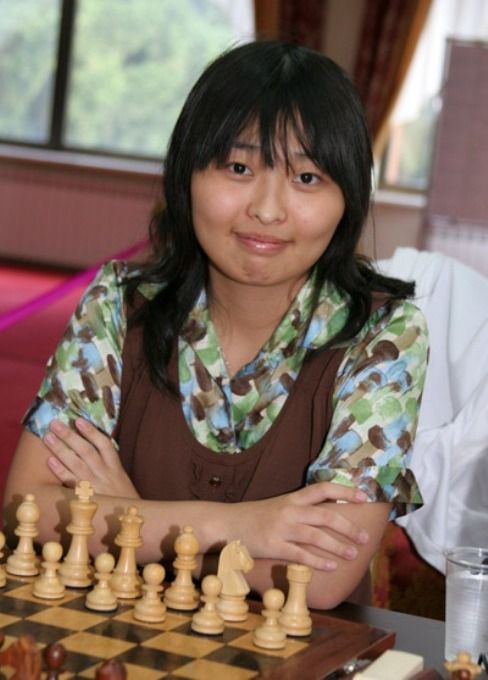GM Ju Wenjun

Bio
GM Ju Wenjun is a Chinese grandmaster and the reigning Women’s Champion since May 2018, when she defeated GM Tan Zhongyi in a match. Ju has defended her title successfully three times: in a November 2018 tournament, a 2020 match against GM Aleksandra Goryachkina, and a 2023 match against GM Lei Tingjie.
Early Life And Career
Ju Wenjun was born in Shanghai in 1991 and calls the city home to this day. In 2004, at the age of just 13, Ju placed second in the Asian Women’s Chess Championship. She thus qualified for the Women’s World Championship in a 2006 tournament and made a surprising run to the third round as a 53rd seed out of 64. However, she lost there to fifth-seeded GM Maia Chiburdanidze. Ju also played in the next five world championship events, in a nine-year span during 2008-2017, without success.

In the meantime, Ju achieved the WGM title in 2009, and that same year she also crossed the 2500-rating threshold for the first time.
In 2010, at age 19, Ju became China’s women's champion for the first time. She claimed the title again in 2014.
In November 2014, Ju was awarded the grandmaster title. However, she had earned all three norms (as well as the 2500 rating) by October 2011, and a mere clerical error is all that prevented earlier recognition.
Becoming Women’s Champion
Ju reached a 2604 rating in March 2017. Other than hitting 2600 exactly in April 2019, it is the only month of her career above 2600, but she has been no lower than 2561 in that time.
Tan had just become a GM by winning the Women’s Championship in 2017, defeating GM Anna Muzychuk in the final round of a 64-player knockout tournament. Ju, meanwhile, qualified for the championship match in May 2018 by winning the 2015-16 Women’s Grand Prix.
After they drew in the first round, Ju and Tan played five consecutive decisive games. Of those, Ju won three, the match’s second, third, and fifth games. After Tan narrowed the gap to 3½-2½ in the sixth game (needing 125 moves to do so), there would suddenly be no more decisive games. But four straight draws was just fine for Ju, and she won the match by one point.
As Women’s Champion
Ju’s first defense of her title came just months after her initial win. The top seed of a 64-player tournament, she won the first round 2-0 and then every round prior to the final by 1½-½. In the final, Ju faced off against Russia’s GM Kateryna Lagno (wife of GM Alexander Grischuk).
Ju’s match against Lagno was somewhat more stressful than the one against Tan. After they drew in the first game, Lagno defeated Ju in the second and then the third game was drawn as well. Ju now needed a win as Black just to force the playoff ... which she did.
After they drew the first two rapid tiebreak games, Ju won the next two to retain her title.
It was only now that FIDE began a women’s championship cycle to mirror the main world championship cycle. In May 2019, an eight-player double round-robin Candidates tournament was held, with Goryachkina emerging victorious to face Ju in January 2020. Whereas the 2018 match with Tan had been 10 games, this one would go 12 before tiebreaks (also mirroring the match for the overall world title).
Three draws began this contest before Ju broke through in game four.
Ju immediately conceded game five and fell behind in the match after losing game eight. However, Ju then immediately recovered with two straight wins, now needing two draws to retain her title.
The 11th game was drawn, but Goryachkina took the 12th. Thus came another tiebreaker. As in November 2018, two draws began the rapid tiebreak, and Ju again won the third tiebreak game. This time, she only drew the fourth, but that was still enough to retain the title.
Ju defended her title yet again in 2023 after a three-year wait, winning the last game of her match against Lei Tingjie.
Olympiads
Ju has played six straight Olympiads representing China. Russia and China have dominated the last five women's Olympiads, Russia winning in 2010, ’12, and ’14 and China claiming the gold in 2016 and ’18.

China’s firepower with GM (and, now, the longtime women's number-one by rating) Hou Yifan on the first board and Ju on the second left little doubt that they would win the 2016 event, and they did.
In the 2018 Olympiad, Ju was on the first board for the first time. Despite losing Hou, China won the women’s gold for the second straight time with Ju playing a large role. In fact, Ju had the highest performance rating of anyone in the tournament.
Future Outlook
Ju has accomplished much. As women’s champion, she cannot go much higher other than to try and extend her reign as long as possible.
What will be difficult for Ju to accomplish is to become the unquestioned best female chess player in the world. While the championship is no doubt an excellent honor, the title opened up in part because her compatriot Hou grew dissatisfied with the women's championship process by 2016 and has generally played only open events against men since then as well.
As of August 2023, Ju is the second highest-rated woman in the world at 2568, 60 points shy of Hou’s 2628. Ju is also three years older than Hou, so a direct comparison between the two stars is unlikely to again favor Ju.
Nonetheless, Ju’s consistent excellence has already given her a place among the best women to play chess, and she has many years ahead of her as well.


